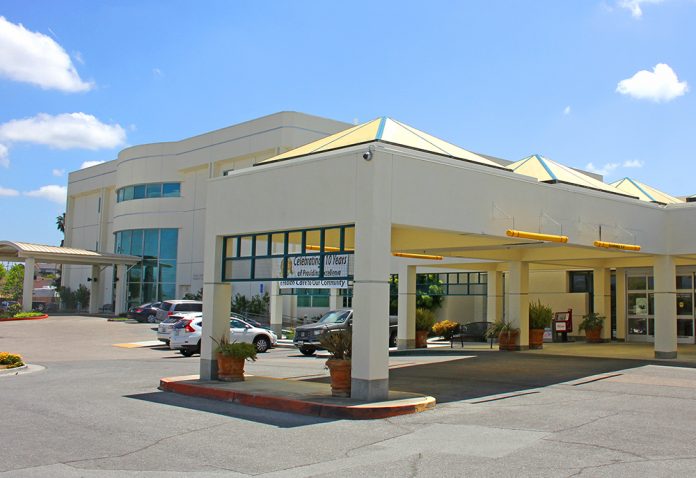The Sept. 20 letter from Salinas Valley Hospital hit Hazel Hawkins with a thud. The larger hospital was pulling out of talks about shared services that held out a prospect of new financial stability for the Hollister hospital.
That same day, however, Hazel Hawkins learned that a year-long Hail Mary effort to convince federal officials to revise its Medicare reimbursement classification appears to have paid off. In the space of a few hours, the hospital’s fortunes improved dramatically.
“For nearly a year our CFO Mark Robinson has been applying for a status change for the hospital,” said Hazel Hawkins CEO Ken Underwood in an interview this week. He said that at the Sept. 27 hospital board meeting, he would be informing them that the way now seemed clear for the hospital to designated as a “Critical Access Hospital,” by federal Medicare officials.
Instead of losing money on Medicare reimbursements—up to 15 percent below costs—, Underwood now said he is optimistic that Hazel Hawkins will be reimbursed, as early as next July, by Medicare on a cost basis.
This likely will mean up to $3 to $ 4 million more per year in hospital revenue, he said.
Underwood said the designation, especially designed for small, relatively isolated rural hospitals, is tough to get and relies on very strict criteria.
“This is a significant development,” he said. “It’s outstanding news.”
The hospital and outpatient bills of about one-third of Hazel Hawkins patients are paid by Medicare, the federal government’s health insurance for seniors. Another third are paid by MediCal, the state’s insurance for low income patients and some with disabilities.
“The board’s mission and vision are to provide quality healthcare services and increase access to these services in San Benito County,” Underwood said. The new Medicare designation will ease the strain on hospital finances, he said.
Specifically, Robinson said he heard last week that the federal Center for Medicare Services had approved the hospital’s “distance requirement”— a make-or-break requirement for the special Medicare designation—that classifies Hollister as a rural area.
“This will alleviate a lot of the concerns in the community” about the ability of Hazel Hawkins to survive financially, concerns that Underwood said increased with news last month that the owners of Saint Louise Regional Hospital in nearby Gilroy were seeking Chapter 11 bankruptcy protection.
Medicare rules dictate that Critical Access hospitals must be at least 35 miles away from the nearest hospitals, on freeway — Saint Louise is about 13 miles away—but this distance rule drops to 15 miles on on secondary roads, and Highway 25 is considered a secondary road.
The second hurdle that Hazel Hawkins must beat is that Critical Access hospital must have fewer than 25 hospital beds.
Underwood said Hazel Hawkins will have no problem with that criterion, because, even though it is licensed at 49 hospital beds, it has average fewer than 17 occupied beds for several years, a 16.8-bed average.
He said the hospital will be applying for a reduction in its number of licensed beds, to 25, to ensure its eligibility for the new designation.
Underwood said he is optimistic that the new designation will go into effect as early as the start of its next fiscal year, July 1, 2019.
He said there will be no changes in hospital services or its staffing levels.
Robinson said the new federal designation will “give us the momentum” to get towards a break-even operation. “We’ve always made it on our own,” said Underwood. The hospital is a $120 million-a-year operation, with about 650 employees, which includes 120 medical staff.
Underwood said the hospital search for the improved Medicare designation was independent of its negotiations with Salinas Valley Memorial, which began in May.
He said the Sept.20 letter from the Salinas hospital was “succinct.” The CEO said the talks ended entirely on Salinas’ initiative, and were not based on any assessment of the his hospital’s financial situation. Underwood also noted that the two hospitals never were discussing any possible sale or lease of hospital operations or health services
“We are sorry to inform you,” he said the letter from Salinas read,”that at this time, Salinas Valley Hospital is not in a position to continue our evaluation of collaborative options” with Hazel Hawkins.
Underwood said the Salinas hospital attributed its decisions to “an unfavorable environment.”
He said the two hospitals would continue their joint purchasing agreements, and will “keep the door open” for future conversations about additional collaborations.
The timing of the decision was not unexpected, because the negotiating period between Hazel Hawkins Memorial Hospital and Salinas Valley Memorial Hospital had closed with no agreement.
The two healthcare systems released a joint statement late Friday, Sept. 21, saying they had agreed to continue to cooperate on behalf of patients.
Salinas Valley President and CEO Pete Delgado stated that his hospital looks forward to “continuing the cooperative relationship we have developed between our two hospitals over the years” and would “continue to work with Hazel Hawkins Memorial Hospital to support the needs of the patients in our communities.”
Currently, Hazel Hawkins uses Silicon Valley purchasing contracts to receive the larger hospital’s lower rates for some supplies. Hazel Hawkins will also have access to Silicon Valley education simulation labs for employees to obtain additional expertise and training.
Looking to the future, the Hollister hospital said it plans to continue work toward finding a strong collaborative healthcare partner. Although the district’s finances have improved over the last several months, CEO Ken Underwood believes a partner will help the hospital reach sustainability and grow at the same pace as San Benito County.
“Our community would benefit in many ways through a partnership,” said Underwood in a statement last week. “The board of director’s vision for collaborating with a larger health system is aimed not only at financial health, but also at enhancing the population health of the community.”
Other top priorities for Hazel Hawkins include enhancing local access to quality specialists and expanding recruitment of high-quality physicians locally.










